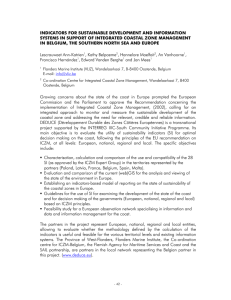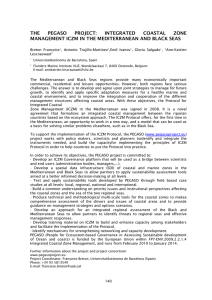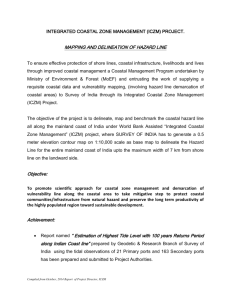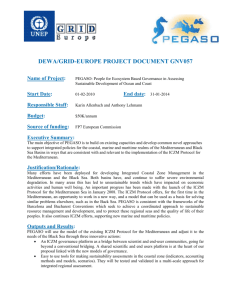15 Integrated coastal zone management
advertisement
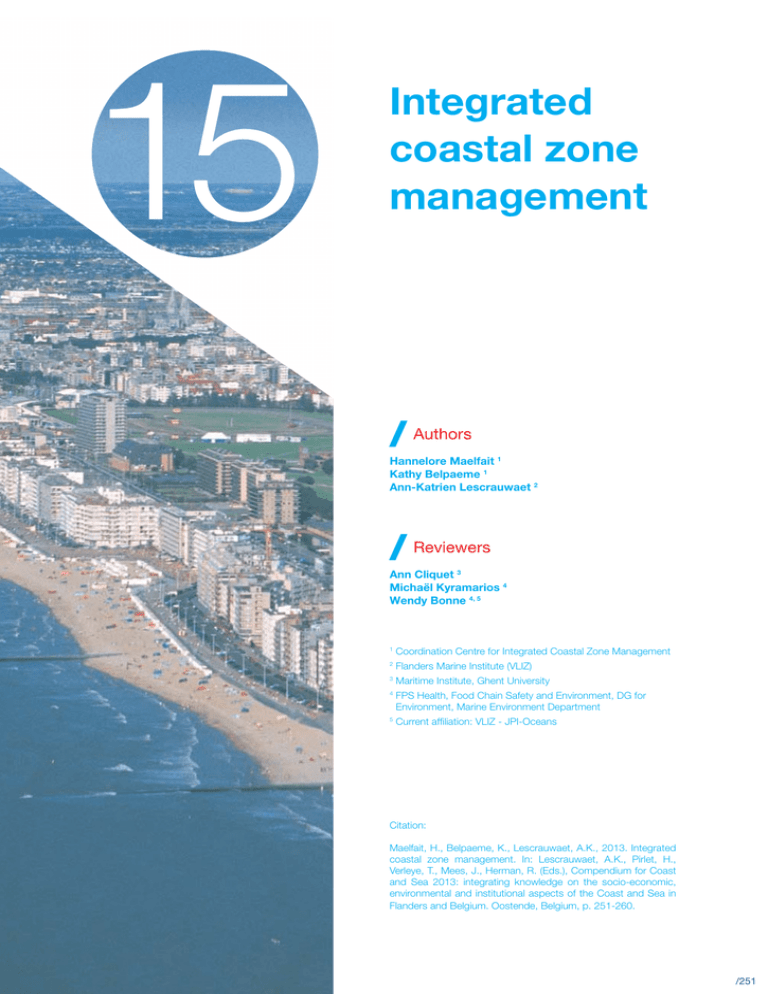
15 Integrated coastal zone management / Authors Hannelore Maelfait 1 Kathy Belpaeme 1 Ann-Katrien Lescrauwaet 2 / Reviewers Ann Cliquet 3 Michaël Kyramarios 4 Wendy Bonne 4, 5 1 Coordination Centre for Integrated Coastal Zone Management 2 Flanders Marine Institute (VLIZ) 3 Maritime Institute, Ghent University 4 FPS Health, Food Chain Safety and Environment, DG for Environment, Marine Environment Department 5 Current affiliation: VLIZ - JPI-Oceans Citation: Maelfait, H., Belpaeme, K., Lescrauwaet, A.K., 2013. Integrated coastal zone management. In: Lescrauwaet, A.K., Pirlet, H., Verleye, T., Mees, J., Herman, R. (Eds.), Compendium for Coast and Sea 2013: integrating knowledge on the socio-economic, environmental and institutional aspects of the Coast and Sea in Flanders and Belgium. Oostende, Belgium, p. 251-260. /251 Integrated Coastal Zone Management (ICZM) or Integrated Coastal (Zone) Management (ICM), coastal zone management for short, represents “a continuous process with the general aim of implementing sustainable development in coastal zones through optimal management of human activities in this area in order to improve the state of the coastal environment and maintain its diversity” (European Commission EC, 1999). The European Union originally focused on ICZM in a recommendation (non-legally binding policy), which aimed at developing a common vision in drafting and implementing national strategies for ICZM. Out of the 20 coastal EU Member States, nine countries – representing for 64% of the European coastline1 – already had a national ICZM strategy in 2005. Belgium, as well as seven other Member States (all in all 18% of the EU coastline), does not have an ICZM strategy but performs additional actions for achieving integrated coastal zone management within the existing policies and legislation. Meanwhile, significant progress has been made in the legal anchoring of ICZM at a regional level in the EU. Moreover, the validity of the recommendation expired in 2006 and the European ICZM instrument was subject to a review. An evaluation was carried out after 10 years of ICZM in Belgium as well (Belpaeme 2011 208453). On 12 March 2013, the EC gave its approval for a draft proposal for a Directive establishing a framework for maritime spatial planning and ICZM (see also theme Marine Spatial Planning). The proposed instrument will require Member States to establish strategies for ICZM, building on the principles and elements of the Council Recommendation on ICZM in 2002. In 2010, the EC also signed the ICZM Protocol for the Mediterranean. This protocol is a legally binding document for all Member States. / 15.1 Policy context In the global context, ICZM was put on the agenda at the UN World Conference on sustainable development (Rio, 1992). In chapter 17 of Agenda 21 (a UN action plan for sustainable development, adopted at the Rio Conference in 1992) the objectives for the protection of oceans, seas and coastal areas were developed. A specific reference to the importance of an integrated approach was included. UNESCO adopted Integrated Coastal Area Management (ICAM) as an independent programme in the 19th session of the Intergovernmental Oceanographic Commission (IOC) meeting in 1997. The objective of this programme is to support the IOC Member States in their efforts to develop marine scientific and technological capabilities with regard to ICZM, following Agenda 21. In the European Member States, ICZM is mainly stimulated by the Recommendation concerning the implementation of Integrated Coastal Zone Management in Europe (2002/413/EC). The ‘ICZM recommendation’ serves as a policy framework to provide a common vision and standard for all Member States. The European ‘ICZM recommendation’ (2002/413/EC) was preceded by a series of European charters and decisions focused on spatial planning and the protection of the coastline (table 1), and was drafted in response to Chapter 17 of Agenda 21. Prior to the European recommendation, Belgium played an active role inter alia by participating in the ‘TERRA CZM’ project (commissioned by the European Commission (1996-1999)) to gather technical information regarding ICZM, and to stimulate a wider debate on sustainable coastal management through the Demonstration programmes 18627. Since the adoption of the recommendation - a non-binding legal instrument - significant progress has been made at the level of the regional seas in the development and endorsement of legally binding regulations on ICZM (ICZM Protocol to the Barcelona Convention on Integrated Coastal Zone Management for the Mediterranean, regulations which are part of HELCOM for the Baltic sea, and the Bucharest Convention for the Black Sea). In the recommendation, the EU invited the Member States to develop national strategies and measures and to report about the progress by 2006 (COM (2007) 308). In order to further promote sustainable development of coastal areas, the European Commission approved a draft proposal for a directive establishing a framework for maritime spatial planning and integrated coastal zone management on 12 March 2013 (COM (2013) 133). The proposed instrument will require the Member States to develop ICZM strategies, building on the principles and elements of the Council Recommendation on ICZM in 2002 (2002/413/EC) and of the Protocol of the Barcelona Convention for the ICZM, as ratified by the EU in 2010. In Belgium, the Coordination Centre for Integrated Coastal Zone Management is the contact point for ICZM. The Coordination Centre was established in 2001 - a year before the ICZM recommendation - as a project of the ‘Objective 2’ programme of the EC. After an initial assessment in 2006, the partners decided to sign the ‘ICZM Protocol’, which confirmed the role of the Coordination Centre as an important instrument for ICZM in Belgium. The Protocol was signed in 2007 by the Provincial Government (Province of West Flanders), the Agency for Nature and Forest (ANB, 1 /252 coastline as defined by EUROSION: http://www.eurosion.org YEAR POLICY INSTRUMENT OBJECTIVE/DESCRIPTION 1973 Decision (73) 29 of the European Council Decision concerning the protection of the coastline. 1981 European Coastal Charter 226578, prepared by the Conference of Peripheral Maritime Regions of Europe Outlines the basic principles for integrated management of coastal areas. 1982 Resolution of the EU Parliament to support the European Coastal Chapter Supports the principles as described in the 'Coastal Charter’. Both the Charter and Decision (73) 29 underline the need for integrated coastal planning in Europe. 1983 European Charter for Regional Planning (CEMAT) Emphasises the need for spatial planning in European coastal areas. 1992 Chapter 17 of Agenda 21 Precursor of a specific European policy on ICZM. Calls for the coastal states to draw up ICZM strategies. Chapter 10 of Agenda 21 also stresses the importance of integrated and sustainable management of land use. 1992 Resolution of the European Council on the future Community policy concerning the European coastal zone (92/C 59/01) Partly in succession to Agenda 21, the European Council recognizes the need for an integrated approach in addressing the challenges of coastal management, and urges the Commission to make a proposal for action in Europe. 1994 Resolution of the European Council on a Community strategy for integrated coastal zone management (94/C 135/02) The EU requests the Member States to protect the coastal zone through a common strategy for integrated management of coastal zones. 19961999 The European Commission launched a Demonstration programme 18627 on sustainable coastal management 35 projects are approved and 6 thematic studies are drafted. The Flemish Region conducts the project TERRA-CZM 'to gather technical information regarding ICZM, and to stimulate a wider debate’. 1999 European Council: Model Law on Coastal protection A proposal for elements of a future model law for coastal protection. 64989 1999 European Council: Code of conduct for coastal zones 20650 2000 A proposal to the EU Parliament and the EU Council for an EU Recommendation on Integrated Coastal Zone Management in Europe (COM (2000) 545) 2000 Communication from the Commission to the Council and the European Parliament on Integrated Coastal Zone Management (COM (2000) 547) Proposed strategy to promote a common approach at European level with regard to the planning and management of the coastal zone. 2001 Coordination Centre for Integrated Coastal Zone Management In the framework of the European 'Objective 2' programme for coastal areas, the Coordination Centre for Integrated Coastal Zone Management is founded in Belgium. 2002 Recommendation concerning the implementation of Integrated Coastal Zone Management (ICZM) in Europe approved by the European Parliament and the European Council, 30 May 2002 (2002/413/EC) Recommendation based on Article 175 of the European Treaty that gives the European Council the possibility to adopt measures in order to protect the environment. In this Recommendation, the EU Member States are requested to develop a national strategy for their coastal policy which takes into account the sustainable development strategy. Furthermore, the preparation of a national inventory of major actors, laws and institutions related to the management of the coastal area is requested. 2002 The 6th Environment Action Programme of the European Community, 2002-2012 (Decision 1600/2002/EC) Confirms ICZM as a priority action, cf. Article 3.10 and 6.2 (g). 2006 National reporting by Member States on the progress of the implementation of ICZM Belgian report on the implementation of the ICZM Recommendation 101811 2007 Communication from the Commission. Report to the European Parliament and the Council: An evaluation of Integrated Coastal Zone Management (ICZM) in Europe (COM (2007) 308) Evaluation of the national implementation of ICZM. A proposal for 'good practice' concerning ICZM. /253 YEAR POLICY INSTRUMENT (continuation) OBJECTIVE/DESCRIPTION 2008 Marine Strategy Framework Directive (Directive 2008/56/EG) Directive establishing a framework for common measures with regard to the policy on the marine environment. 2008 Roadmap for Maritime Spatial Planning (MSP). Communication from the Commission (COM (2008) 791) Proposal by the European Commission to apply common principles for MSP in the EU, with reference to the relationship between ICZM and MSP (section 5.9). 2011 Evaluation of 10 years of ICZM in Belgium (September 2011) Report '10 jaar Coördinatiepunt, een kwestie van evenwicht' (Belpaeme 2011 208453) 20112012 Impact analysis, Consultation process 226580 and revision of the ICZM Recommendation Is carried out in consultation with the evaluation on future action on MSP (see theme Marine Spatial Planning). 2013 Draft proposal of the European Commission and the Council for a directive establishing a framework for maritime spatial planning and integrated coastal zone management (COM (2013) 133) Flemish Government, Ministry of Environment, Nature and Energy), the Coastal Division (MD&K, Flemish Government, Department of Mobility and Public Works), and the Flanders Marine Institute (VLIZ) as a scientific partner (Flemish Government, Department of Economy, Science and Innovation). In 2009, the Marine Environment Department (Federal Public Service of Health, Food Chain Safety and Environment) also became a partner (Belpaeme 2011 208453). Belgium is a coastal Member State with limited coastal and marine areas where a multitude of policy levels are active (see Chapter 3 of the Compendium for Coast and Sea). Given the fragmentation of competences, the integration and deliberation of sectoral visions and plans in the coastal area are crucial. In this regard, the various competent authorities each have an internal responsibility to implement ICZM. Although an administrative anchoring of ICZM in Belgium is not on the agenda (at the moment), the policy framework and the principles of ICZM are gradually incorporated into the sectoral policy for the coast. Belgium does not have an ICZM strategy, but performs additional actions for achieving ICZM in the context of existing policies and legislation. In 2006, the validity of the recommendation (2002/413/EC) expired. In anticipation of the revision process, the Member States were asked to work on a second national report covering the period from 2006 to 2010. In 2011, the ICZM recommendation was subjected to a revision. An evaluation was carried out after 10 years of ICZM in Belgium as well (Belpaeme 2011 208453). / 15.2 Spatial use ICZM cannot be regarded as a user of space; rather it is a process to optimize the spatial use in the coastal zone on land and at sea, and in particular at the interface between land and sea. The definition and delimitation of the geographical concept of ‘coastal zone’ was not a straightforward process both on an international and European level (EU Code of Conduct for Coastal Zones, 1999 20650). For the operation of the Coordination Centre for Integrated Coastal Zone Management in Belgium, a definition of “coastal zone” was chosen stretching from the polders to the territorial sea (figure 1). In practice, this means that the coastal zone policy involves the 10 coastal municipalities (De Panne, Koksijde, Nieuwpoort, Middelkerke, Oostende, Bredene, De Haan, Blankenberge, (Zeebrugge), Knokke-Heist) and 9 hinterland municipalities (Damme, Brugge, Zuienkerke, Jabbeke, Oudenburg, Gistel, Diksmuide, Veurne, Alveringem and LoReninge). On the seaward side, the coastal area is bordered by the 12-mile zone. Other definitions of the ‘coast’ or ‘coastal zone’ are available on: http://www.coastalatlas.be/en/themes/generalsetting/definitie-kust/. 15.2.1 Implementation of the policy context in Belgium The fragmentation of the different competent authorities within the various policy areas and geographic areas of the coastal area constitutes a major challenge for most Member States whose target is to achieve an effective coastal zone management. This is also the case for Belgium (table 2). /254 DEMARCATION OF THE COASTAL AREA Figure 1. Demarcation of the coastal area, as defined by the Coordination Centre for Integrated Coastal Zone Management in Belgium, showing the 12-mile zone at sea and the 10 coastal municipalities and 9 hinterland municipalities on the landward side of the ‘coastal zone’ (www.coastalatlas.be). The issues for integrated coastal zone management in Belgium are partly addressed in the following publications: Tussen Land en Zee: dringend… nood aan een integraal kustzonebeheer: 10-puntenprogramma voor integraal kustzonebeheer in België (Natuurreservaten vzw en WWF 1994) 19104, Belpaeme 2001 22507, Advies van de Mina-raad van 5 april 2001 over het geïntegreerd beheer van kustgebieden 66206 and Cliquet et al. 2002 30285 (Legal inventory of the coastal zone in Belgium). Although Belgium has no strategy for ICZM, the recommendations and the principles stipulated in the EU recommendation (2002/413/EC) are followed up by the Coordination Centre for ICZM (website). Through the Protocol (2007), the partnership of the Coordination Centre for ICZM was given an organizational structure (figure 2) and strategic objectives that are achieved through a multi-year plan. The three strategic objectives of the Coordination Centre for ICZM are: • To contribute to the implementation of the European Recommendation concerning the implementation of ICZM in Europe (2002/413/EC); • To promote the integration of planning and policy in the coastal zone; • To create a platform for integrated management of the coastal zone. To achieve these objectives, the following operational objectives have been established: • To communicate and raise awareness about the ICZM; • To act as contact point for the ICZM; • To provide a platform for discussion with regard to ICZM; • To monitor the sustainability indicators of the coastal zone; • To contribute to the achievement of the recommendations of the European Recommendation on the implementation of ICZM in Europe. /255 Table 2: An overview of the competences in the coastal area in Belgium (Belpaeme et al. 2011 207333). A detailed overview of the competences with regard to the coast and sea is given in Chapter 3 of the Compendium for Coast and Sea. SEA LAND Legal description Ecological description Legal description Ecological description Territorial sea Seawater Internal waters Intertidal EEZ Seabed and substrate Territory of the coastal and hinterland municipalities Mudflats and salt marshes Continental shelf Beach Dunes Coastal polders Competent authority Federal Shipping Shipping Defense Defense Seabed exploitation Energy Energy (offshore wind) Control (police) Cables and pipelines Disaster management Marine environmental protection Control (police) Disaster management Science policy Flemish Region Dredging Environment and nature conservation Piloting Spatial planning Rescue at sea Groundwater extractions Shipping assistance Tourism Removal of wrecks Harbours Commercial marine fisheries Coastal defence Public domain management Science policy Province W. Fland. Assistance in disaster management Coastal municipalities Implementation of higher legal standards Implementation of higher legal standards Police Maintenance beaches (in concession) In September 2011, Belgium celebrated the 10th anniversary of ICZM and a critical reflection was made in the publication ‘10 jaar Coördinatiepunt een kwestie van evenwicht’ (Belpaeme 2011 208453). See also the publications: Cliquet et al. (2002) 105155 and Cliquet et al. (2004) 72542 for a reflection on the administrative context of ICZM in Belgium. / 15.3 Societal interest Integrated management does not only provide a more qualitative and sustainable policy but is, according to a scientific study by the European Commission, also cost-effective. The study shows that investments in integrated coastal management provide social benefits in the long term that are on average 10 times higher (An Assesment /256 ORGANISATIONAL STRUCTURE OF THE COORDINATION CENTRE FOR ICZM Executive Committee Administrative consultation steering Secretariat organises gives reaction supporting Task Force Coastal forum Ad-hoc-working group Figure 2. Organisational structure of the Coordination Centre for ICZM. of the Socio-Economic Costs & Benefits of Integrated Coastal Zone Management: Final Report To The European Commission, 2000 27587). In the Belgian ICZM Recommendation Report of 2006 101811, a number of recommendations are made to address the coastal policy together and in a sustainable way. The stimulation of specific projects on sustainable coastal management, the use of indicators as a scientific instrument, and a higher involvement of the coastal actors through a coastal forum are some of them. A shared long-term vision for the coast is also one of the targets, as well as closer cooperation between the competent authorities. In the Belgian ICZM recommendation report of 2010 226549, the realizations for the period 2006-2010 in response to the recommendations are further elaborated (see Sustainable use). / 15.4 Sustainable use Based on the national reports, the European Commission concluded that a continuous effort is required to put effective ICZM in Europe into practice. An overview of ‘good practices’ with regard to ICZM in the EU Member States can be found in the European database OURCOAST. PERCEIVED DEGREE OF IMPLEMENTATION OF SUSTAINABLE COASTAL ZONE MANAGEMENT Phase 1: Planning and management are carried out in the Belgian coastal zone Phase 2: A framework exists for the implementation of ICZM yes no Phase 3: Most aspects of the ICZM-approach are present and function well Phase 4: An efficient, adapted and integrated process is embedded on all levels of government and results in a more sustainable coastal region 0% 20% 40% 60% 80% 100% Figure 3. Perceived degree of implementation of sustainable coastal zone management (Maelfait et al. 2012 221016). /257 For the monitoring of the ICZM implementation, the European Commission has developed an instrument through an ICZM Expert Group for the Member States. The ‘ICZM progress indicators’ were also applied in Belgium. During the first assessment, the participants-evaluators indicated that effective planning and management are carried out in the Belgian coastal zone through structural plans, monitoring, protection statutes and other legal instruments, but they equally believed that these instruments are not or insufficiently integrated (figure 3). Although all the elements for ICZM are available, the implementation of the process is still insufficient with regard to the involvement of coastal actors, openness in communication from the competent authorities and especially with regard to the legal anchoring of ICZM plans and strategies. The accessibility and timely availability of quality-controlled information to underpin coherent and effective decisions were positively evaluated (Maelfait et al. 2012 221016). The report ‘10 jaar Coördinatiepunt een kwestie van evenwicht’ (Belpaeme 2011 main achievements and measurable effects of ICZM in the Belgian coastal area. ) provides an overview of the 208453 15.4.1 Visions for the development of the coastal region Recently, several visions from different perspectives (academia, policy, industry, etc.) have been drafted for the development of the coastal zone. Some of these initiatives are listed below: • In the policy document of the Architect of the Flemish Government, Peter Swinnen (Swinnen 2010 226551), the coast is defined as an area with a potentially strong appeal and international recognition. The Flemish Government Architect wants to scan the architectural and spatial margins of Flanders on the coast with a study of regional or cross-border areas in the report ‘Metropolitaan Kustlandschap 2100’ 225477 (not finished yet). • The Kappaplan 220908 of ‘Natuurpunt’ provides a vision and an overview of existing and potential measures to prepare the coast for the impacts of climate change. • In the context of a European project ‘Coastal Communities 2050 128455’, it has been examined whether the different visions that are currently being developed can be aligned and may reinforce each other. • The department of Mobility and Public Works coordinates the project Flanders Bays (included in the coalition agreement of the Flemish Government, regeerakkoord van de Vlaamse regering (2009-2014) 225478). The project aims at developing a vision of the future of the Flemish coast, with the recovery of a wide and ‘soft coast’ and the protection against a changing environment. The vision also provides space for the development of the seaports. • The coast as an area for development was also the basis of the CcASPAR project. The CcASPAR project (Climate change and changes in spatial structures in Flanders, funded by the Agency for Innovation by Science and Technology (IWT)) has conducted research on the spatial impact of climate change in order to formulate spatial adaptation strategies and sustainable policy implications for Flanders at different spatial scales. The strategies developed were tested on the coast and in the Yser estuary (Allaert et al. 2012 221516). • Initiatives of ‘Oostende Werft’ and the Coordination Centre for ICZM: workshop ‘Beeldkwaliteit aan de Kust’ (2010, website Coordination Centre) and workshop ‘De Kust moderniteit’ (2013). /258 / Legislation reference list Table with European legislation. The consolidated version of this legislation is available on Eurlex. EUROPEAN LEGISLATION Abbreviations (if available) Title Year Number Directive 2008/56/EC establishing a framework for community action in the field of marine environmental policy (Marine Strategy Framework Directive) 2008 56 Council resolution of 25 February 1992 on the future Community policy concerning the European coastal zone 1992 92/C 59/01 Council resolution of 6 May 1994 on a Community strategy, for integrated coastal-zone management 1994 94/C 135/02 Proposal for a European Parliament and Council Recommendation concerning the implementation of Integrated Coastal Zone Management in Europe 2000 545 Communication from the Commission to the Council and the European Parliament on integrated coastal zone management: a strategy for Europe 2000 547 Recommendation of the European Parliament and of the Council of 30 May 2002 concerning the implementation of Integrated Coastal Zone Management in Europe 2002 413 Decision No 1600/2002/EC of the European Parliament and of the Council of 22 July 2002 laying down the Sixth Community Environment Action Programme 2002 1600 Communication from the Commission - Report to the European Parliament and the Council: an evaluation of Integrated Coastal Zone Management (ICZM) in Europe 2007 308 Communication from the Commission - Roadmap for Maritime Spatial Planning: Achieving Common Principles in the EU 2008 791 Proposal for a directive of the European Parliament and of the Council establishing a framework for maritime spatial planning and integrated coastal management 2013 133 Directives Marine Strategy Framework Directive Other (Decisions, Communications, White Papers, etc.) /259

